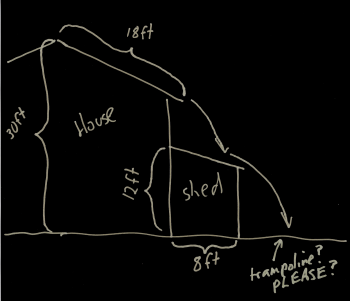Off the Roof
The peak of my house is 30 feet off the ground. The roof has a 1/3 rise-over-run, and a slant length of 18 feet. Attached to the side of my house there is a woodshed, which stands 12 feet tall at the roof peak, where it attaches to the building, and has a 20 degree slope. The width of the shed is 8 feet. Oh...and the house roof overhangs a horizontal distance of one foot.

One fine day I'm sitting at the peak of my roof solving physics problems, when suddenly I lose my balance and go sliding down the roof. Reaching the end, I go airborne momentarily, until I crash into the shed roof and continue sliding downward until I go airborne a second time, and then crash into the ground.
Assuming (as we so often do in our crazy, cartoony physics world) the coefficient of friction between me and the roof is 0, and assuming that there is no air resistance, what will my speed be when I reach the ground?
The peak of my house is 30 feet off the ground. The roof has a 1/3 rise-over-run, and a slant length of 18 feet. Attached to the side of my house there is a woodshed, which stands 12 feet tall at the roof peak, where it attaches to the building, and has a 20 degree slope. The width of the shed is 8 feet. Oh...and the house roof overhangs a horizontal distance of one foot.

One fine day I'm sitting at the peak of my roof solving physics problems, when suddenly I lose my balance and go sliding down the roof. Reaching the end, I go airborne momentarily, until I crash into the shed roof and continue sliding downward until I go airborne a second time, and then crash into the ground.
Assuming (as we so often do in our crazy, cartoony physics world) the coefficient of friction between me and the roof is 0, and assuming that there is no air resistance, what will my speed be when I reach the ground?



 1932
1932
